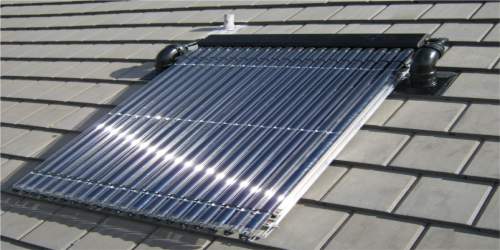Read Time : 4 Minutes
How much does a solar thermal system cost?
What is the cost of a solar thermal hot water system?
The cost of solar thermal systems vary, but normally you can expect to pay between £3,000 and £8,000 (including a reduced rate VAT of 5%). These figures include installation costs and all parts (solar collectors, control panel, pipes, hot water tank). The price of your system will depend on the type and quality of the panels.
A typical well-insulated twin coil cylinder system will be priced at around £4,500 according to the Solar Trade Association. It is also possible to buy DIY solar thermal kits with all the necessary hardware, which normally cost between £1,500 and £2,500. Your system may need to be installed by an MCS accredited installer to benefit from any government incentives. There currently aren't any financial incentives available in the UK although this may change.
Plumbing costs may increase if the building has a complicated or antiquated water system. If scaffolding is needed then the installation costs could be considerably higher. The costs of integration with current systems could add further expense. The size of system (the number of collectors and water cylinder capacity) you will require depends on the hot water demand of your home, business or organisation. A general rule of thumb is that you’ll need 1m² for each person living in the building. Solar thermal collectors are usually around 2-3m², so for an average 3-4 bedroom house you will require 2 collectors.
As the average person will use around 50 litres of hot water each day, a normal 4 bedroom house will require a 200 litre tank. The quality of collector used also impacts upon the total initial cost of the project. As noted already, evacuated tube systems cost slightly more than flat panel systems, but are more efficient. Compare prices from local companies fast & free Enter your postcode to compare quotes from leading professionals. We promise to keep your information Safe & Secure. Privacy Policy
COMPARE PRICES FROM LOCAL INSTALLERS
Potential savings when using Solar Thermal
The potential savings offered by solar thermal systems are difficult to calculate exactly and depend on a large range of factors. These include:
- Initial system cost (depending on size, quality of parts and installation).
- The energy source that you are replacing (coal, gas, electricity, LPG, oil, etc.).
- The property’s suitability for solar panels (and the total output of the system - usually between 1000-2500kWh in the UK).
- The property’s energy efficiency.
- Your geographical location and solar resource.
- Available financing incentives.
- The cost of the fuel you use for your backup water heating system, if you have one.
- Your energy needs (the solar thermal system will not provide all of your hot water needs).
Though the above range of factors needs to be taken into account when calculating the potential savings offered by solar thermal systems, it is possible to give a rough idea of how much you can expect to save.
| Energy source being replaced | Approx annual energy bill saving* |
|---|---|
| Coal | £55 |
| Electricity | £95 |
| Gas | £60 |
| LPG | £100 |
| Oil | £75 |
* These potential savings are given only as a guide. You should always ask prospective installation companies to give you a quote for the expected performance of solar thermal systems. MCS-accredited companies should do this for you.
The typical output of a domestic solar thermal installation in the UK is between 1000kWh and 2500kWh, though once again this depends on individual factors. This means that householders who install solar thermal technology can expect to recoup their initial investment after 10-15 years.
While the energy bill savings outlined may seem modest, they do not take into account the extent to which installing solar thermal systems can protect you from rapidly rising energy bills.
It is necessary to underline the fact that a solar thermal system will not fully replace your existing water heating system, and will not provide any space heating. The actual percentage of your water heating demand covered by solar thermal will depend on your energy consumption habits (though this figure is usually between 40% and 60%). Obviously, solar thermal systems are most productive in the summer, when there is most sunlight. You will therefore rely more on other, non-renewable energy sources during the winter months. If you are planning on adding a solar thermal system to a new build or as part of a larger refinancing job as part of a mortgage, then your payments on the money lent may be considerably lower.
Cost factors to consider
In recent years, renewable energy technologies have gained considerable attention as the world seeks more sustainable and environmentally friendly alternatives to traditional energy sources. Solar thermal systems, also known as solar water heating systems, have emerged as a promising solution for reducing carbon emissions and mitigating climate change. In the United Kingdom, the adoption of solar thermal systems has been steadily increasing due to government incentives and growing public awareness of the need for clean energy. This article examines the cost of solar thermal systems in the UK, exploring various factors influencing their prices and the long-term benefits they offer.
Initial Investment Costs:
The cost of installing a solar thermal system in the UK can vary significantly depending on several factors, such as the system size, complexity, and location. On average, the initial investment for a domestic solar thermal system ranges from £3,000 to £6,000. This cost typically includes the solar collectors, a hot water storage tank, pumps, controllers, and installation expenses. For commercial or larger-scale installations, the cost can be substantially higher but comes with greater potential for savings on energy bills.
Operational and Maintenance Costs:
One of the key advantages of solar thermal systems is their relatively low operational and maintenance costs compared to conventional heating systems. Once installed, these systems require minimal maintenance, typically limited to periodic inspections and occasional servicing. The absence of fuel costs contributes to long-term savings, making solar thermal systems an attractive option for those seeking cost-effective and sustainable heating solutions.
Energy Savings and ROI:
The primary appeal of solar thermal systems lies in their ability to generate free and renewable energy from the sun. By utilizing solar energy to heat water, homeowners and businesses can significantly reduce their dependence on fossil fuels, thus lowering energy bills and carbon footprints. The amount of energy savings and ROI depends on factors like local solar irradiance, hot water demand, and the system's efficiency.
Payback Period:
The payback period for solar thermal systems can vary widely based on installation costs, energy savings, and the availability of government incentives. In general, a well-designed and adequately sized system can achieve a payback period of around 5 to 10 years. After this period, the system generates nearly free hot water, resulting in substantial savings over its extended lifespan.
Environmental Benefits:
Beyond financial advantages, solar thermal systems offer significant environmental benefits. By reducing reliance on fossil fuels, these systems help combat air pollution and greenhouse gas emissions. The UK's commitment to meeting renewable energy targets underlines the importance of adopting solar thermal systems as part of the nation's clean energy mix.
Conclusion:
As the UK continues to transition towards a more sustainable future, solar thermal systems play a crucial role in harnessing renewable energy and reducing carbon emissions. While the initial investment cost may be a consideration for some, government incentives, long-term energy savings, and environmental benefits make solar thermal systems an attractive and viable option. By choosing to invest in solar thermal technology, individuals and businesses can not only lower their energy bills but also contribute to a greener and more sustainable planet.
Find a local installer
Welcome to the biggest directory of UK renewable energy companies





 How do Solar Thermal Panels work
How do Solar Thermal Panels work






